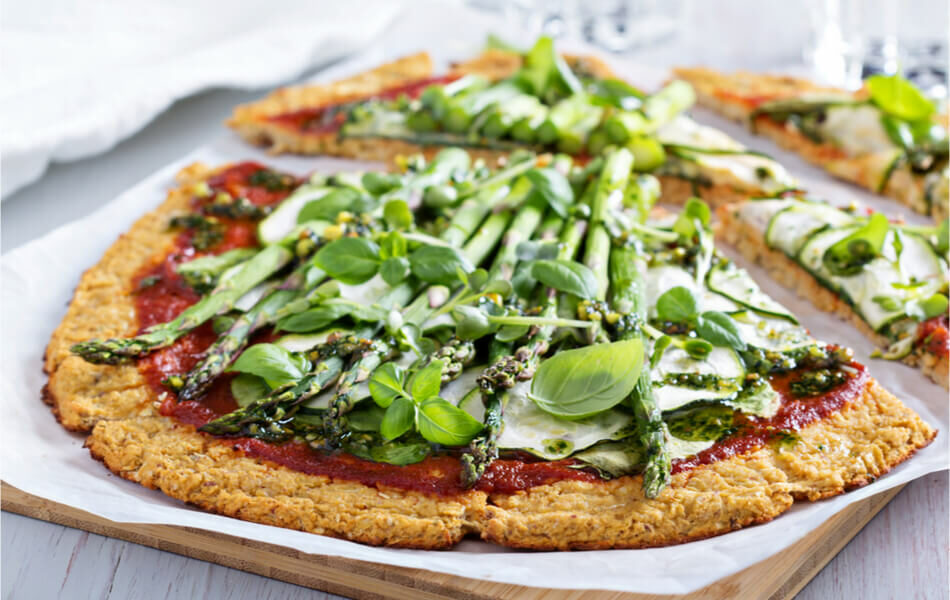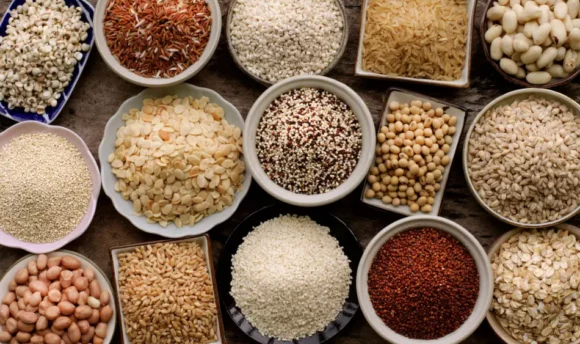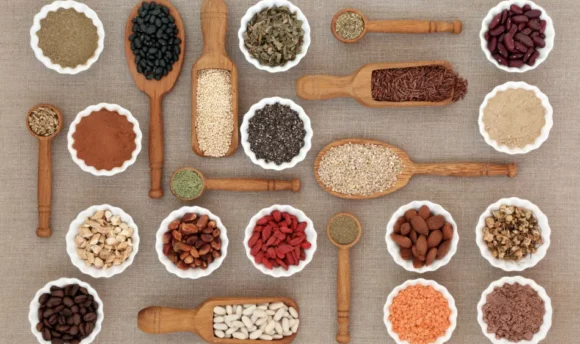Is Cauliflower Pizza Healthy? Nutrition, Calories, Ingredients
You’ve probably heard of cauliflower mashed potatoes, but what about cauliflower pizza crust? Crust made from cauliflower is a trendy vegetable-based pizza alternative, but is it actually better for you than regular pizza?

Cauliflower crust is a tasty alternative to thin-crust pizza using flour-based pizza crust. In addition to its flavor, the crust is gluten-free and lower in calories, carbohydrates, fat, and sodium.
Imagine replacing the flour in your pizza crust with cauliflower instead! You’ve probably heard that cauliflower pizza crust is not only tasty but better for you than regular pizza crust. Read more now to find out the truth!
How Is Cauliflower Pizza Crust Made?
Cauliflower crust is made from cooked cauliflower rice, egg, cheese, and seasoning. The cauliflower rice is made by running fresh cauliflower through a food processor. Once the cauliflower is cooked and ground up, it is dried as much as possible with a cloth to remove excess moisture.
Next, the cauliflower is mixed with egg, cheeses, and seasoning, formed into a crust, and baked on a baking sheet just like regular pizza crust!
Is Cauliflower Pizza Healthy?
Is cauliflower pizza crust healthy compared to regular pizza?
Yes, cauliflower pizza is healthier than pizza with regular crust, as it is lower in calories, carbohydrates, and sodium. You could even try making a pizza on cauliflower tortillas for a lighter snack option!
Additionally, cauliflower provides essential nutrients such as folate and vitamin C with many health benefits. Vitamin C, also found in citrus fruits, strawberries, and bell peppers, helps support a strong and healthy immune system to fight off infections and disease. Folate, often in leafy dark green vegetables, is a part of healthy red blood cell functioning and cell development.
Adding more fruits and veggies on top is a healthy option to increase antioxidant consumption. Antioxidants are compounds that work to reduce inflammation in the body.
Cauliflower Pizza Crust vs. Standard Crusts
Cauliflower crust replaces the gluten-based flour with cauliflower that has been combined with egg, cheese, and seasoning. Cauliflower is naturally much lower in calories, sodium, and carbohydrates than traditional pizza crust.
However, some fat is added back since the cauliflower alternative has cheese in the crust, while traditional pizza crust does not. This is because most cheeses, such as mozzarella cheese, tend to be very high in fat, including saturated fat. Nevertheless, reduced fat, non-fat, or even non-dairy cheese can be used in the crust.
Standard pizza crust often has almost twice as many carbohydrates as cauliflower pizza crust. This is because carbohydrates come from the flour or wheat in the regular pizza dough. Excess carbohydrates in the diet can lead to weight gain.
While it varies greatly by the brand (if store-bought) or recipe (if homemade), typically, crust made from cauliflower is lower in sodium as well.
Cauliflower Crust Nutrition Facts
Let’s go over the nutrition information for cauliflower crust pizza – keep in mind that 100g of cauliflower pizza crust is approximately half a standard-sized pizza!
Nutrition table (per 100g)
| Calories/Nutrient | Amount |
| Calories (kcal) | 196 |
| Net Carbs (g) | 25g |
| Fiber (g) | 1.8g |
| Sugar (g) | 1.79g |
| Fats (Total) | 7.14g |
| Protein (g) | 10.7g |
| Cholesterol (mg) | 18mg |
High in sodium
Research has shown that increased salt consumption can lead to an increased risk of high blood pressure, heart attack, and stroke. Therefore, the Centers for Disease Control and Prevention and the 2020–2025 Dietary Guidelines for Americans recommend no more than 2,300 milligrams of sodium per day.
While this varies greatly by brand, cauliflower pizza typically has less sodium or salt than standard pizza crust. For example, cauliflower pizza has only 188mg of salt per 100g serving.
Additionally, reducing sodium intake can reduce uncomfortable thirst and bloating. Bloating is sometimes your body holding on to water and fluid to balance out high salt levels.
Low in protein
Unfortunately, whether a pizza crust is made with flour or cauliflower, they all tend to be relatively low in protein. However, cauliflower crusts have slightly more protein due to the cheese and egg.
Protein is made up of small compounds called amino acids. Amino acids are crucial because it gives the body the building blocks it needs to function. Proteins are an essential part of every body system, from the digestive system to the immune system to the cardiovascular system.
To increase the protein on your pizza, top it with meat, poultry, or meatless protein sources, such as tofu or tempeh. While vegetables are a nutritious pizza topping packed with vitamins and minerals, they typically are not very high in protein.
Low in fats and calories
Depending on the brand or recipe, cauliflower pizza crust can have up to 150 fewer calories per 100g serving when compared to traditional pizza crust or whole wheat crust. If you are looking to lose weight, cutting a few calories here and there can make a difference in helping you reach your health goals.
On the flip side, cauliflower pizza crust often has more fat from the cheese added to it to bind it together. However, this higher amount of fat in the crust can be offset slightly by using reduced-fat cheeses or non-dairy cheeses to make the pizza crust and top the pizza.
Some crust made from cauliflower also includes healthy fats from olive oil or other unsaturated fat sources.
High in carbs
In many cases, using cauliflower in the pizza crust reduces the number of carbohydrates by almost half compared to regular crust pizza!
However, if you consume an excessive amount of carbohydrates that are not burned as energy, the leftover carbohydrates can be stored as fat.
Eventually, the buildup of fat can lead to weight gain or obesity and increase the risk of chronic health diseases, such as high blood pressure or high cholesterol.
Lowering your excess carbohydrate intake can prevent weight gain and even promote weight loss. However, it is essential not to restrict your carbohydrate intake too much, as it could lead to rapid weight loss that is not healthy.
FAQs
A 100g serving of cauliflower pizza crust, without any toppings, contains 25g of carbohydrates. Keep in mind that 100g of the crust is approximately half a pizza. Therefore, one-eighth of the pizza crust would only have about 6.25g of carbohydrates, which is very low.
However, this may vary slightly per brand, especially if the crust is homemade.
Yes, cauliflower pizza is very low in carbohydrates and calories, making it an excellent standard pizza crust or whole-wheat crust alternative for weight loss. This is especially true for store-bought crusts that have a lot of additional ingredients added in.
Yes, in most cauliflower pizza crust products and recipes, the regular wheat flour or whole-wheat dough is replaced entirely by cauliflower. However, occasionally, store-bought cauliflower pizza crusts will also contain gluten-free flour. This alternative can include chickpea flour, tapioca flour, potato flour, etc.
If you are looking for a gluten-free pizza, ensure the pizza sauce and all of the pizza toppings do not include any wheat or gluten ingredients. Overall, cauliflower crust is an excellent option for those following a gluten-free diet, especially those diagnosed with Celiac disease.
A Word From a Dietitian
Cauliflower crust pizza can be an excellent option for those looking to reduce their calorie, carbohydrate, and sodium intake but still want to enjoy their delicious pizza. However, cauliflower crust pizza can be slightly higher in fat than the traditional crust; it is still a simple way to get another vegetable into your pizza dish.
Cauliflower pizza is also gluten-free, making it a suitable choice for individuals with celiac disease who have to avoid eating gluten to avoid uncomfortable symptoms.
When deciding if cauliflower pizza crust is healthy for you, your choice should not only rely on calories, carbohydrates, and sodium. Instead, be mindful of whether you genuinely like the taste!
Having a pizza crust you enjoy not only makes the meal more pleasurable but could lead to eating fewer calories if you are satisfied with the food.
Conclusion
Cauliflower crust is a delicious and nutritious alternative to wheat-based pizza crust, lower in calories, carbohydrates, and sodium. Adding cauliflower to your pizza is also a great way to change up your typical pizza routine, especially if you are looking for a healthier option.
So next time you are making pizza dough, give healthy cauliflower pizza crust a try!

















































 Select your language:
Select your language: 








